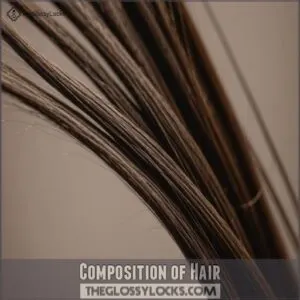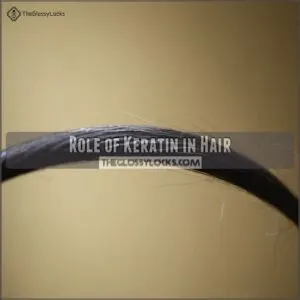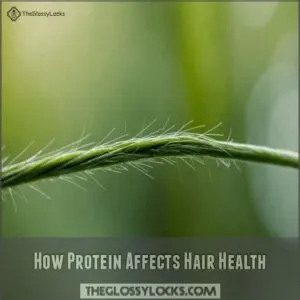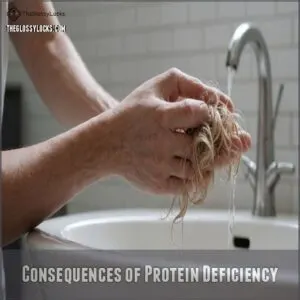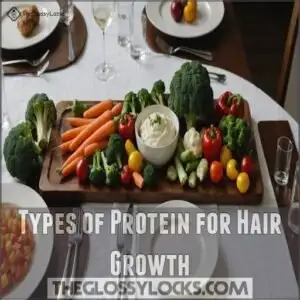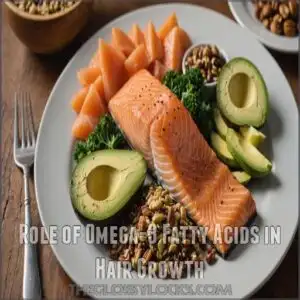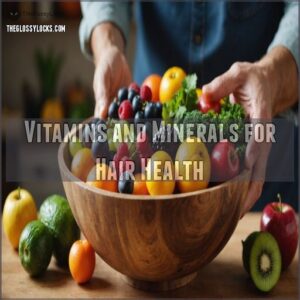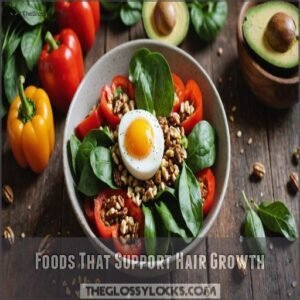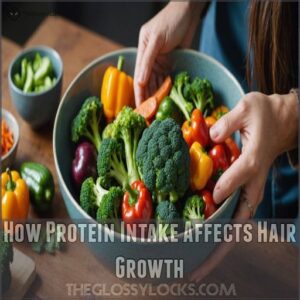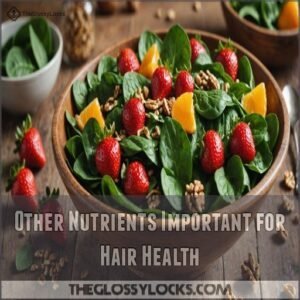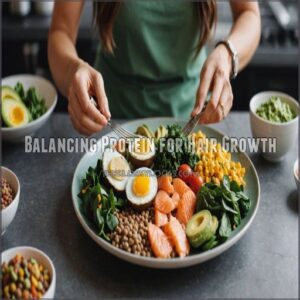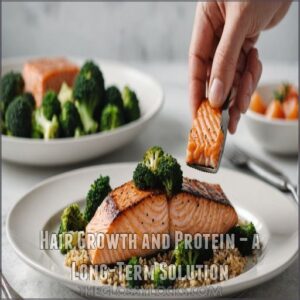This site is supported by our readers. We may earn a commission, at no cost to you, if you purchase through links.
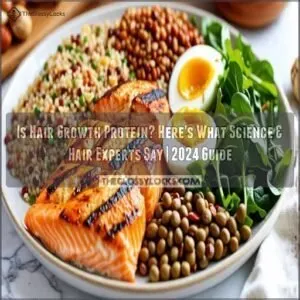 Your hair doesn’t just grow – it’s protein in action!
Your hair doesn’t just grow – it’s protein in action!
Your strands are made of keratin, a tough protein that’s like nature’s building blocks for gorgeous locks.
When you’re not getting enough protein, your hair can become as lifeless as a wet noodle (and trust us, that’s not the look you’re going for).
Think of protein as your hair’s BFF – it’s essential for strength, growth, and that enviable shine.
You’ll need about 0.8 grams of protein per kilogram of body weight daily to keep your hair game strong.
But here’s the kicker – knowing which proteins work best can transform your hair from meh to magnificent.
Table Of Contents
- Key Takeaways
- Is Hair Made of Protein
- Importance of Protein for Hair Growth
- Types of Protein for Hair Growth
- Role of Omega-3 Fatty Acids in Hair Growth
- Vitamins and Minerals for Hair Health
- Foods That Support Hair Growth
- How Protein Intake Affects Hair Growth
- Other Nutrients Important for Hair Health
- Balancing Protein for Hair Growth
- Hair Growth and Protein – a Long-Term Solution
- Frequently Asked Questions (FAQs)
- Does protein increase hair growth?
- Is hair a protein or not?
- Can lack of protein cause hair thinning?
- Is hair full of protein?
- When is the best time to eat protein?
- Can excess protein damage hair follicles?
- How quickly does protein affect new hair growth?
- Does cooking method affect proteins impact on hair?
- Should protein intake vary by hair type?
- Conclusion
Key Takeaways
- Your hair is made of 95% keratin, a tough protein that gives it structure and strength. This is why protein intake directly impacts hair health.
- You’ll need about 0.8 grams of protein per kilogram of body weight daily (46-56 grams for most adults) to maintain healthy hair growth.
- You can spot protein deficiency in your hair within 2-3 months through signs like brittleness, increased shedding, and slower growth.
- You can find a variety of high-quality protein sources such as lean beef, chicken, and salmon that provide essential nutrients. You’ll get better results from whole food protein sources (like eggs, legumes, and these animal-based options) compared to supplements, as they provide additional nutrients that support hair health.
Is Hair Made of Protein
Your hair isn’t just a fashion statement – it’s actually made almost entirely of a protein called keratin, the same stuff that forms your fingernails.
You’ll need plenty of protein in your diet to keep your hair healthy and growing strong, since your body uses those protein building blocks to create new hair strands every day.
Composition of Hair
Understanding your hair’s structure is like getting to know an old friend – it’s mostly protein, making up about 95% of its composition.
Your hair strands are built from cells packed with fibrous proteins, arranged in a complex structure that gives your locks their strength and flexibility.
These protein-based cells form three distinct layers: the cuticle, cortex, and medulla, working together to create your unique hair texture.
Role of Keratin in Hair
Inside your hair strands, keratin works like nature’s building blocks, creating a strong yet flexible structure.
Your hair’s keratin profile directly impacts its appearance and health.
Here’s what keratin does for your hair:
- Forms protective outer layer that shields inner structures
- Creates natural shine and smoothness
- Provides elasticity to prevent breakage
- Determines your hair’s natural texture and wave pattern
Importance of Protein for Hair Growth
You’ll find protein at the heart of every healthy hair strand, as it provides the essential building blocks your body needs to create strong, vibrant locks.
When you don’t get enough protein in your diet, your hair can become brittle and may even start falling out after just two to three months of deficiency.
How Protein Affects Hair Health
Through a complex biological process, protein becomes your hair’s building block, directly impacting its growth and strength.
Your hair follicles use protein to create new strands during the growth phase.
Let’s break down how protein works in your hair:
| Process | Role | Impact |
|---|---|---|
| Creation | Forms keratin structure | Determines hair strength |
| Repair | Rebuilds damaged areas | Maintains hair health |
| Growth | Fuels follicle activity | Controls growth rate |
Consequences of Protein Deficiency
When protein levels drop too low, your body plays favorites – and hair isn’t at the top of the list.
You’ll notice signs beyond hair loss: brittle nails, constant fatigue, and mood swings might pop up.
Your immune system takes a hit too, leading to frequent illness.
The good news? These issues typically show up after 2-3 months of low protein intake, giving you time to adjust your diet.
Types of Protein for Hair Growth
You’ll find protein powerhouses for your hair in both animal and plant sources, from protein-packed salmon to nutrient-rich legumes.
Whether you’re a meat lover or plant-based enthusiast, you can build stronger, healthier hair by choosing the right proteins that work best for your lifestyle and dietary needs.
Animal-Based Protein Sources
Your hair loves animal protein, and here’s why: these complete proteins pack all nine essential amino acids your hair needs to stay strong and healthy.
You’ll find these powerhouse nutrients right in your kitchen.
- Fresh salmon that melts in your mouth (hello, protein and omega-3s!)
- Farm-fresh eggs that make your breakfast shine
- Tender chicken breast that keeps you satisfied
- Rich bone broth that warms you from the inside out
Plant-Based Protein Sources
Plant-based proteins pack a powerful punch for your hair health.
If you’re not into animal products, don’t worry – nature’s got your back with plenty of options.
For those looking to supplement their diet, consider exploring vegan hair growth supplements that can help address common hair challenges like thinning and brittleness.
Here’s a quick look at your top plant-based protein picks:
| Protein Source | Grams per Serving | Hair Benefits |
|---|---|---|
| Lentils | 18g per cup | Iron-rich, growth |
| Quinoa | 8g per cup | Amino acids |
| Edamame | 17g per cup | High in biotin |
| Chickpeas | 15g per cup | Zinc powerhouse |
These protein-rich plants will keep your locks looking luscious!
Collagen and Hair Growth
Looking beyond plant proteins, collagen emerges as a powerhouse for hair health.
This protein isn’t just a buzzword – it’s naturally found in bone broth, fish, and chicken.
Your body converts collagen into keratin, the primary protein in hair, helping to boost strength and resilience.
While supplements are popular, you’ll get better results from collagen-rich whole foods in your daily meals.
Role of Omega-3 Fatty Acids in Hair Growth
You’ll be amazed to learn that omega-3 fatty acids aren’t just for your heart health – they’re also key players in getting thicker, healthier hair.
While protein builds your hair’s structure, incorporating natural DHT blockers, such as those found in DHT Blocking Foods, can help reduce hair loss and promote hair growth. Omega-3s from foods like salmon and flaxseeds help reduce hair loss and boost hair density, as shown in recent studies.
Food Sources of Omega-3 Fatty Acids
Omega-3 fatty acids are abundant in everyday foods you might already enjoy.
Fatty fish like salmon and mackerel pack the biggest punch, offering two servings worth in just one meal.
These omega-3 fatty acids reduce inflammation in the scalp.
Don’t eat fish? No problem – flaxseeds, chia seeds, and walnuts have got you covered.
Even avocados bring omega-3s to the table, making your morning toast work harder for your hair.
Benefits of Omega-3 for Hair Health
Diving deep into hair science reveals how omega-3 fatty acids work wonders for your locks.
These essential fats don’t just help your heart – they’re your hair’s best friend too.
If you’re looking for an easy way to incorporate omega-3s into your hair care routine, consider using an Omega 3 Hair Oil product that nourishes your hair from the outside in.
Here’s what omega-3s do for your hair:
- Reduces inflammation around hair follicles
- Increases blood flow to the scalp
- Strengthens hair from within
- Prevents dry, brittle strands
Studies show these benefits kick in after about 6 months of consistent intake.
Vitamins and Minerals for Hair Health
Your hair isn’t just craving protein – it’s hungry for a full menu of vitamins and minerals that work together like a well-oiled machine.
You’ll find that essential nutrients like biotin, zinc, and vitamins A through E are the secret ingredients that help transform your hair from lifeless to luxurious.
Biotin and Hair Growth
You’ve probably heard about omega-3s, but biotin is another hair growth superstar.
This B-vitamin helps create the building blocks for healthy hair growth.
Here’s what you need to know about biotin sources and benefits:
| Food Source | Biotin Content (mcg) | Daily Value % |
|---|---|---|
| Eggs (1 whole) | 10 | 33% |
| Almonds (1oz) | 6 | 20% |
| Sweet potato | 4.8 | 16% |
| Salmon (3oz) | 5 | 17% |
Think of biotin as your hair’s personal construction crew – it keeps everything running smoothly from root to tip.
Zinc and Hair Health
Zinc plays a key role in maintaining healthy hair, acting like a building block for growth and repair, similar to how protein intake for hair growth is crucial for building each strand, supporting overall hair strength and development.
You’ll find this essential mineral packed into oysters – just two medium ones give you enough zinc for the day.
If you’re not big on seafood, nuts, seeds, and legumes are solid alternatives.
Research shows zinc deficiency can lead to hair loss, so keeping your levels up is key.
Other Essential Vitamins and Minerals
Beyond the spotlight-stealing zinc, your hair needs a full cast of vitamins and minerals to truly shine.
Your follicles are like tiny factories that depend on these essential nutrients to produce healthy hair.
- Vitamin D works with your hair follicles‘ receptor cells to spark new growth
- Iron carries oxygen to your scalp’s cells, preventing hair loss
- Biotin strengthens hair structure and reduces breakage
- Selenium helps your body process hair-building proteins efficiently
Foods That Support Hair Growth
You’ll be amazed at how many everyday foods can transform your hair from lackluster to luxurious, especially when you know which nutrients to focus on.
From protein-packed eggs to omega-rich salmon, your kitchen might already have the ingredients needed for healthier, stronger hair growth.
Dark Leafy Greens and Hair
Dark leafy greens pack a powerful punch for your hair’s health.
These nutrient powerhouses also contain vitamin C, a key component of Vitamin C Serum Benefits, which can help promote hair growth and strengthen hair follicles. These nutrient powerhouses contain iron, vitamin A, and folate – essential players in preventing hair loss and promoting growth.
Spinach, kale, and arugula are particularly rich in these nutrients.
If you’re dealing with thinning hair, loading up your plate with these greens can help combat iron deficiency, a common culprit behind hair loss.
Nuts and Seeds for Hair Health
While leafy greens pack a punch, nuts and seeds are your hair’s secret weapon.
These power-packed snacks deliver key nutrients that support healthy, lustrous locks.
Here’s what they bring to the table:
- Almonds flood your system with biotin, preventing brittleness
- Pumpkin seeds load you up with zinc for stronger strands
- Walnuts dish out omega-3s for scalp health
- Chia seeds boost protein levels for thicker growth
Keep a handful handy for on-the-go hair care!
Berries and Citrus Fruits for Hair
Your fruit bowl can be a powerful ally for healthier hair.
Berries and citrus fruits pack a punch with vitamin C, which helps your body absorb iron and produce collagen – both key players in hair growth.
Many fruits, such as papaya for preventing baldness, strawberries, blueberries, and oranges are particularly rich in antioxidants that protect your hair follicles from damage.
Try adding these fruits to your breakfast or snacks for an easy hair health boost.
How Protein Intake Affects Hair Growth
You’ll be surprised to learn that your hair is practically begging for protein, as it’s the essential building block that makes up about 90% of each strand.
If you’re not getting enough protein in your diet, you might notice your hair becoming brittle or falling out, since your body starts prioritizing protein for essential functions over hair growth.
Signs of Protein Deficiency in Hair
Spotting protein deficiency in your hair isn’t rocket science.
When protein levels drop, you’ll notice your strands becoming brittle and prone to breakage.
Watch for thinning hair, especially around the temples, and unusually slow growth.
Your once-vibrant locks might look dull and lifeless, while split ends become more frequent.
If you’re shedding more than usual, that’s another red flag worth checking out.
Recommended Daily Protein Intake for Hair Growth
Getting the right amount of protein keeps your hair strong and healthy.
Most adults need between 46-56 grams daily, with active people requiring more.
You can also consider taking protein hair growth supplements to support your hair growth journey.
For reference, that’s about two palm-sized portions of chicken or fish.
You’ll want to spread your protein intake throughout the day – think of it like giving your hair regular fuel stops to maintain steady growth.
Other Nutrients Important for Hair Health
While protein is essential for your hair, you’ll need more than just protein to keep your locks looking their best.
Your hair’s health depends on a team of nutrients working together, including iron for oxygen delivery to your follicles, vitamin E for protection against damage, and antioxidants to fight off environmental stress.
Iron and Hair Growth
Many people don’t realize that iron plays a key role in delivering oxygen to your hair follicles.
When you’re low on iron, your body prioritizes essential organs over hair growth, leading to thinning and loss.
If you struggle to get enough iron from your diet, consider taking iron supplements daily.
You’ll find iron in red meat, spinach, and lentils.
For better absorption, pair iron-rich foods with vitamin C sources like citrus fruits or bell peppers.
Vitamin E and Hair Health
While iron keeps your hair follicles well-fed, Vitamin E works as your hair’s personal bodyguard.
This powerful nutrient fights off free radicals that can damage your scalp and weaken your strands.
Additionally, foods rich in omega-3 fatty acids, such as fatty fish sources, can also nourish your scalp and strengthen your hair.
You’ll find plenty of Vitamin E in almonds, sunflower seeds, and avocados.
Research shows that people taking Vitamin E supplements saw a 34.5% increase in hair growth – making it a smart addition to your hair care routine.
Antioxidants and Hair Growth
Your hair’s health depends on antioxidants, which fight off free radicals that can damage your follicles.
Think of antioxidants as your hair’s personal bodyguards.
You’ll find these protective compounds in colorful fruits like blueberries and pomegranates, as well as dark chocolate and green tea.
When you boost your antioxidant intake, you’re helping your hair stay strong and grow better.
Balancing Protein for Hair Growth
You’ll need the right amount of protein to keep your hair healthy and strong, just like your body needs fuel to function at its best.
While protein powder might seem like a quick fix, getting your protein from whole foods like eggs, fish, and legumes can give you better results for your hair growth journey.
Finding The Right Balance of Protein
Getting the right amount of protein doesn’t have to feel like solving a puzzle.
Most adults need 0.8 grams of protein per kilogram of body weight daily for healthy hair.
That’s about 56 grams for men and 46 grams for women.
Think of it as eating two palm-sized portions of lean meat, fish, or legumes daily.
Mix it up with eggs at breakfast and nuts for snacks.
Protein Powder and Hair Growth
Protein powder’s link to hair growth has sparked heated debates.
Research shows no direct correlation between protein supplements and hair loss, putting those gym-goer worries to rest.
Whey protein isolate may have some potential drawbacks, such as spiking insulin and accelerating hair loss.
Here’s what you should know about protein powders:
- Most protein powders contain all essential amino acids
- Whey protein is quickly absorbed by your body
- Plant-based options work just as effectively
- No evidence suggests protein powder causes hair thinning
- Some powders include biotin for extra hair support
Whole Foods Vs. Supplements
While protein powders offer convenience, whole foods pack a powerful punch for hair health.
Natural sources like eggs, fish, and legumes provide not just protein but also essential vitamins and minerals that work together.
Think of it like building a house – you’ll want quality materials, not just quick fixes.
Plus, whole foods are easier for your body to process and use effectively.
Hair Growth and Protein – a Long-Term Solution
You’ll find that a long-term approach to hair growth isn’t just about loading up on protein shakes and hoping for the best.
Your path to healthier hair starts with understanding how much protein you actually need and working with experts to create a sustainable plan that fits your unique needs.
Creating a Personalized Diet Plan
Three key steps reveal your personalized diet plan for healthy hair growth. Track what you eat using a food diary app to understand your current habits and nutrient gaps.
- Set realistic diet goals based on your lifestyle – aim for sustainable changes you’ll stick with
- Break down your daily macro needs into practical meal portions
- Plan your weekly meals around protein-rich foods that support hair health
Consultation With a Healthcare Professional
Getting expert guidance can make all the difference in your hair growth journey.
Here’s when you should book an appointment with a healthcare pro:
| Concern | When to See a Professional |
|---|---|
| Hair Loss | Sudden or patchy hair loss |
| Diet Issues | Difficulty meeting protein needs |
| Medical History | Taking medications affecting hair |
| Test Results | Unexplained nutrient deficiencies |
Don’t hesitate to reach out – they’re there to help you achieve those healthy hair goals!
Frequently Asked Questions (FAQs)
Does protein increase hair growth?
Protein is essential for hair growth since it provides the amino acids needed to build keratin, your hair’s main component.
You’ll notice stronger, healthier hair when you eat enough protein-rich foods daily.
Is hair a protein or not?
Yes, your hair is primarily made of a protein called keratin.
It’s what gives your strands their structure and strength.
That’s why getting enough protein in your diet helps maintain healthy hair.
Can lack of protein cause hair thinning?
When you don’t get enough protein, your hair can start thinning within 2-3 months.
Your body prioritizes essential functions over hair growth, so maintaining adequate protein intake is vital for keeping your locks healthy.
Is hair full of protein?
Like a well-built skyscraper’s steel frame, your hair’s structure is primarily made of keratin – a tough protein.
In fact, you’ll find that about 95% of your hair’s composition is pure protein.
When is the best time to eat protein?
Spread your protein intake throughout the day for best absorption.
You’ll get the best results by consuming protein-rich foods within 30 minutes after exercise.
And include some at each meal you’re eating.
Can excess protein damage hair follicles?
Research doesn’t support that excess protein damages hair follicles. Your body efficiently processes extra protein, though you’ll want to stay hydrated and maintain a balanced diet for excellent hair health.
How quickly does protein affect new hair growth?
Your body takes about 2-3 months to turn dietary protein into visible hair growth. You’ll notice stronger, healthier strands emerging as new hair cycles begin with consistent protein intake.
Does cooking method affect proteins impact on hair?
While you might think cooking doesn’t matter, it actually does!
Gentle cooking methods like steaming or poaching help preserve protein’s structure, making it easier for your body to use it for hair growth.
Should protein intake vary by hair type?
Basic protein needs don’t change with hair type.
Coarse or curly hair might benefit from slightly higher intake.
These strands typically need more structural support.
Just don’t overdo it.
Conclusion
Looking good isn’t rocket science – it’s protein science!
Now you know that hair growth protein isn’t just another beauty buzzword.
From keratin-rich foods to omega-3s, you’ve got the tools to transform your locks.
Remember, your hair’s health reflects what’s on your plate.
Whether you’re team animal protein or plant-based powerhouse, consistency is key.
Start nourishing your hair from within, and you’ll be turning heads for all the right reasons!

